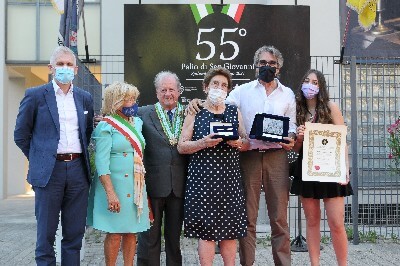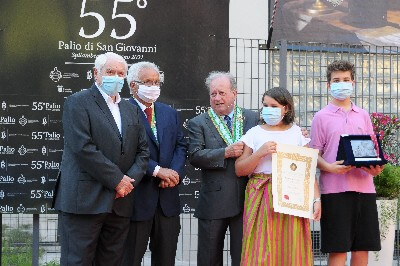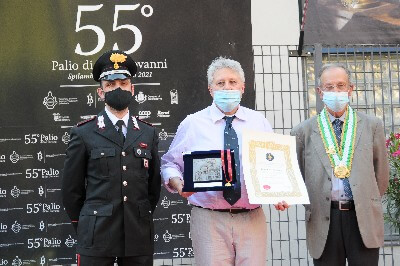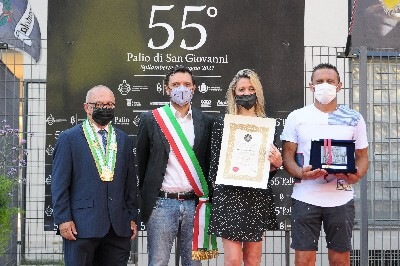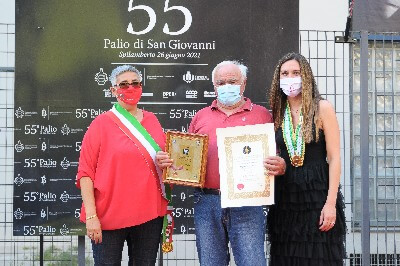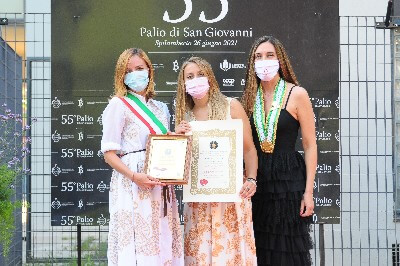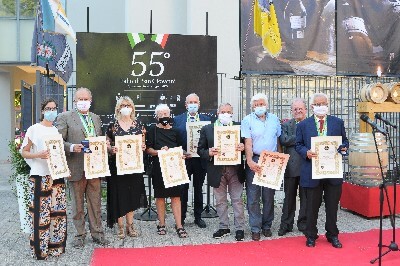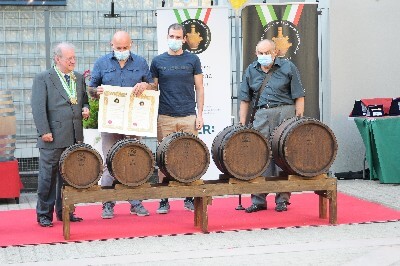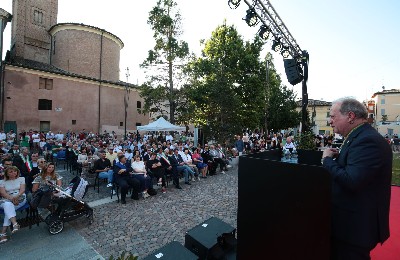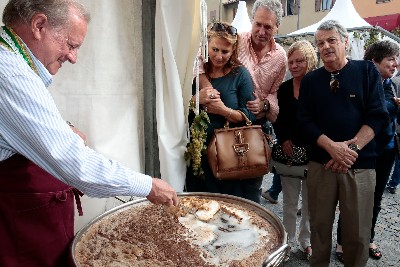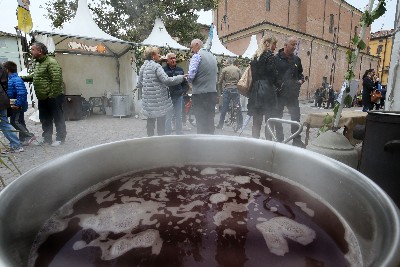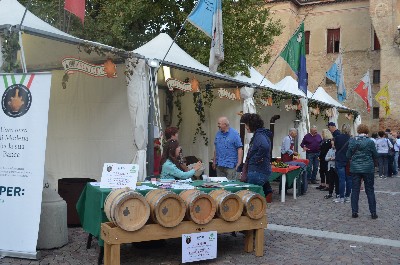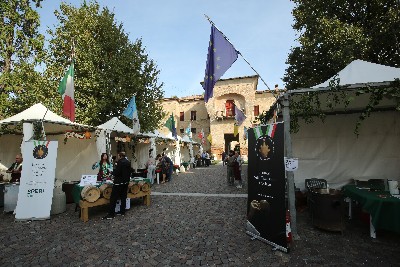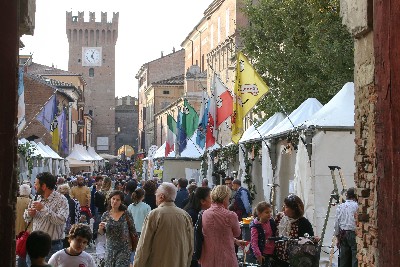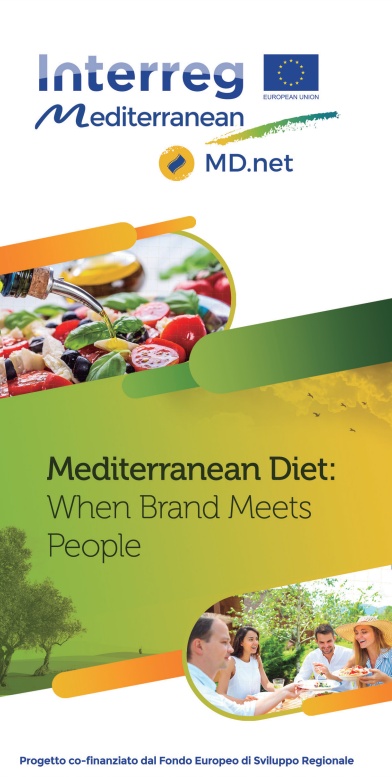The Fair of San GiovanniIl Palio, a traditional event held every year since 1967Palio and Superpalio
Since 1967, organised by the Consorteria dell’Aceto Balsamico Tradizionale di Spilamberto, the Palio di San Giovanni has been held annually. It is a competition between the Traditional Balsamic Vinegars produced in their area of origin (the ancient d’Este territory). The event brings several hundred ‘Balsamic’ champions to Spilamberto, the first twelve of whom receive a coveted and precious award each year. The Superpalio is a special edition of the Palio di San Giovanni, held under particular circumstances. So far, the Superpalio Rolando Simonini (1990) was held to celebrate the founder of the Consorteria who passed away in 1985, as well as the Superpalio on the occasion of its 20th anniversary (1986), the 30th anniversary (1996) and the 50th anniversary (2016) of the founding of the Association. All finalist champions of previous editions of the Palio di San Giovanni may participate in the Superpalio.
Every year, on the occasion of the Palio di San Giovanni (the patron saint of Spilamberto), the Consorteria’s expert tasters collect and evaluate almost 1,500 samples of Balsamic vinegar, produced in the ancient d’Este territories. It is only in this slice of Po Valley land that Balsamic Vinegar may be produced. Perhaps it is the unmistakable smell of this land, made damp and soft by the fog, where the finest Trebbiano and Lambrusco grapes grow, or perhaps it is the cold and harsh climate in winter with its hot and hazy summers, perhaps it is the patience in cooking the must on an open fire and in the cauldron, or perhaps it is the experience in conducting and taking care of the slow transformation of the cooked must in the casks. Balsamic is still a unique product, born in these lands, from customs handed down to this day from generation to generation, thanks to the knowhow that lies behind it.
Mast Còt, cooking the must in the town square
“It’s autumn… the housewife sits at the loom weaving and singing, or she cooks the must, the sweet juice, on the fire carefully removing the foam from the bubbling liquid in the pot with a ladle.” This is how Virgil in the 1st century BC described a farmhouse in the Emilia area in his Georgics: to this day, the magic of Traditional Balsamic Vinegar begins this very same way, from the ancient gestures of cooking must, which in Spilamberto are revived every year at the beginning of October and involve the entire community.
“This is a tradition handed down from generation to generation, which has come down to us practically unchanged,” explains Grand Master Maurizio Fini. “Already in Virgil’s time, must was cooked and brought to different degrees of concentration. The sapa was obtained with a long cooking time that led to a reduction in volume of up to 70%. Diluted with wine vinegar, it was then used to prepare sweet-and-sour dishes often found on Roman dining tables, as reported by Marcus Gavadius Apicius, a cook at the time of Emperor Tiberius (40 BC – 37 AD). This product was none other than saba, the syrupy grape must used to prepare Christmas sweets, which in the past was used by the poor as a sweetener instead of honey, which was more expensive and less readily available.
Defrutum, on the other hand, was a product obtained from a grape must that was much less cooked and reduced by only a third: it is a proven fact that, due to its relative concentration, defrutum is spontaneously attacked by the yeasts responsible for its alcoholic fermentation, which constitutes the initial development phase of Balsamic Vinegar.
“Even today, thanks to the millennial transmission of the knowledge of our ancestors, we cook the must on the fire, in open-air pots and reduce it to a maximum of 30%: a full-blown defrutum that – thanks to intuition or chance – we learned to store in wooden barrels. Inside the large pots of the “dulcis musti” are concentrated knowledge, passion, slowness, the purely Modenese honesty with which we respect the slow and natural cycle of ripening of the vine and grapes. After pressing, it is a duty and essential for those who love Balsamic to repeat the millenary gestures linked to cooking: it is from this ritual – which has become an occasion for celebration, renewal, social gathering after months of isolation – that a product that is unique in the world is born ” , concludes Fini. At least ten thousand days of patient and skilled care will be needed, slowly scanned in the half-light of the attics to enjoy inimitable aromas and flavors: but the Traditional Balsamic Vinegar and its people, you know, are in no hurry.
Open Vinegar Attics
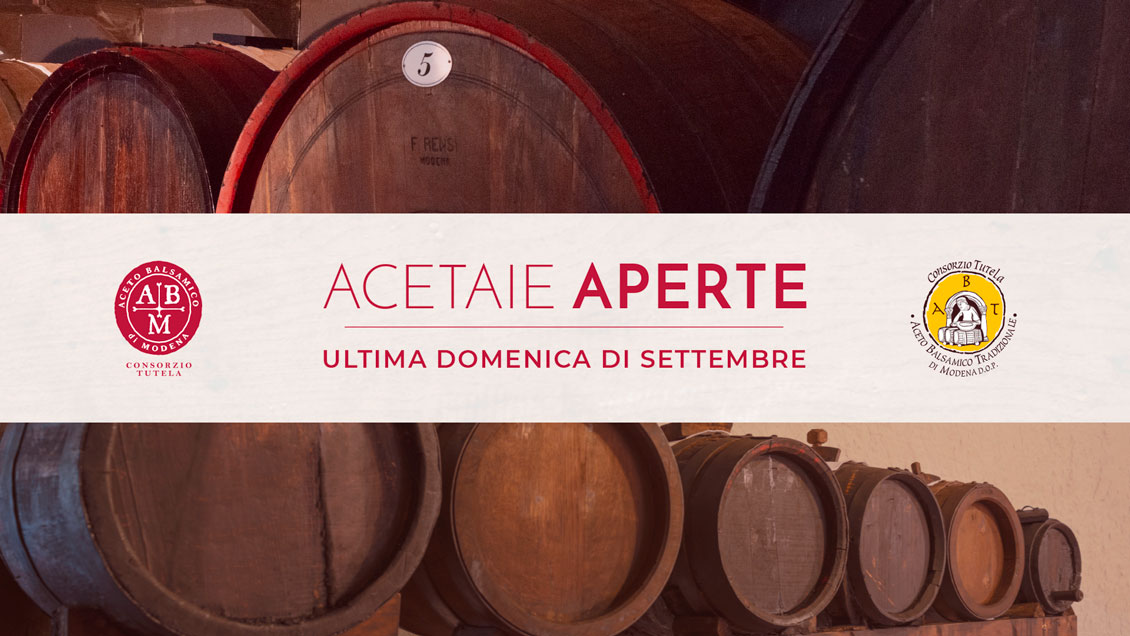
On the last Sunday in September, guided tours and tastings await you amidst barrel sets, casks and fermentation vats.
The ABTM Museum participates in the Acetaia Aperte day: an event organised by the Consortium for the Protection of Balsamic Vinegar of Modena and the Consortium for the Protection of Traditional Balsamic Vinegar of Modena, with the aim of promoting the culture of this precious foodstuff with its centuries-old history. More than 30 companies from the province of Modena open their doors to show how two of the most precious gastronomic treasures of our territory are created.
Lots of side events are organised directly at the vinegar attics. You can find a list of all the open vinegar attics, complete with contact details, on the “Acetaie / Vinegar Attics” page. Plan your visit, so you too can experience the Balsamic thrill!
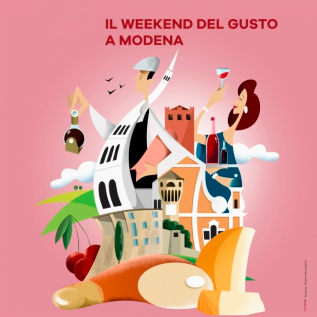
Gusti A.Mo
A weekend for the discovery of all things wonderful from Modena!
The ABTM Museum takes part in Gusti A.Mo., an event organised every year in October, in which the consortia of Modena’s PDO and PGI products, together with other local entities, invite you to spend a weekend full of culinary events. The protagonists will not only be tastings but also guided tours of typical product companies, shows, show cooking and many other activities to get to know Modena and its many specialities.
MDnet
MDnet is an acronym of Mediterranean Diet – When Brand Meets People
There is a growing demand for food quality (nutritional, taste, culture) and an equally growing demand for quality of life linked to the experiences of the territories and traditions that are the basis of agrifood excellence. These questions can be answered with the enhancement of the territorial brand of the Mediterranean Diet.
In the spring of 2021, the Traditional Balsamic Museum signed the Med Diet Declaration and joined the MDnet project, an acronym for Mediterranean Diet – When Brand Meets People. The distinctive features of the territory influence lifestyles and nutritional models. The MD.net project is aimed at fostering economic growth and social inclusion in the territory, with a focus on the main themes of the Mediterranean Diet.
The promotion of the Mediterranean Diet – using all available tools and technologies – constitutes an indispensable tool for communities, both to disseminate information on the relationship between health and food, food safety, production techniques, control and guarantee systems, and to create higher quality tourism, linked to the emotional paths of food and to a more complex yet more realistic conception of the Mediterranean Diet as a lifestyle.

